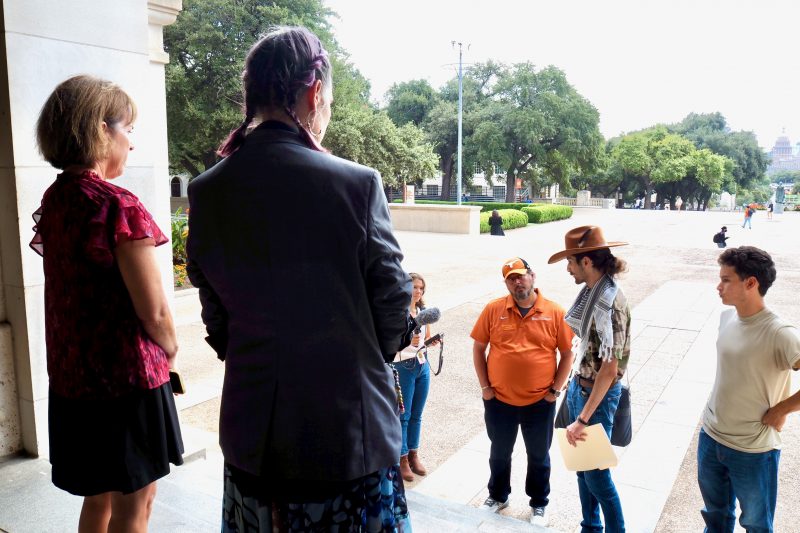Student Activists Stopped from Delivering Pro-Palestine Letter to UT President, Say They Could Face Disciplinary Action
By Michael Karlis and Meredith McKelvey
Reporting Texas

Student activists Arshia Papari and Luca Reyes, at right, talk with UT Joe LoBrutto, director of UT’s new event and readiness response team, outside the UT Tower as representatives of the president’s and provost’s office look on. The students were attempting to deliver a letter to UT President Jay Hartzell. Meredith McKelvey/Reporting Texas
More students at the University of Texas say they face disciplinary action after attempting to deliver a letter to President Jay Hartzell on Wednesday demanding the university divest from companies connected to Israel’s war in Gaza and grant amnesty for student protesters arrested and disciplined last spring.
Wednesday’s action comes after UT-Austin instituted harsher policies against student protesters after city police and state troopers were called in to arrest and disperse pro-Palestinian demonstrators in April. The UT protests came as college students nationwide protested Israel’s military campaign in Gaza, which has killed more than 43,000 Palestinians, according to the Gaza Health Ministry.
The latest incident on campus Wednesday stems from what student organizers describe as a “breach of trust” between UT-Austin’s recently formed event and readiness response team and pro-Palestine protesters.
Student activist Arshia Papari and Austin Students for a Democratic Society President Luca Reyes, both second-year students at UT-Austin, attempted to hand deliver a demand letter to Hartzell’s office on the fourth floor of the UT Tower. They were confronted by Joe LoBrutto, director of UT’s event and readiness response team, on the steps outside the building.
“If you opt to go in, just know that we have discussed this previously — we talked with you yesterday, we spoke with you on the phone this morning — and you said you would agree to these terms,” LoBrutto said during the tense standoff with Papari and Reyes.
“We did not agree to have the letter outside,” Papari said in response.
Despite LoBrutto’s warning, Papari and Reyes both entered the Tower but said LoBrutto, other university employees and police stopped them from reaching Hartzell’s office.
When Papari and Reyes emerged from the Tower 40 minutes later, they said LoBrutto was forwarding their alleged infraction to the dean of students office. Papari told Reporting Texas that LoBrutto took pictures and recorded their conversation during their attempt to enter Hartzell’s office.
LoBrutto did not respond to Reporting Texas’ request for comment or to confirm that the students were threatened with disciplinary action.
UT’s event and readiness response team was created this fall to inform protesters of the university’s free-speech policies. Before becoming director of the unit, LoBrutto was a detective sergeant for the UT Police Department and acted as law enforcement at the spring protests.
Emails obtained by Reporting Texas show that LoBrutto urged Austin Students for a Democratic Society to deliver the organization’s demand letter to representatives from the provost’s and president’s offices on the steps outside the UT Tower. The email did not warn the students that delivering the letter to Hartzell’s staff offices inside the UT Tower would violate university policies. The university’s speech, expression and assembly policy does not contain any rules on delivery of such letters.
Papari and Reyes said they had not agreed to deliver the letter to university representatives on the steps outside the building.
“We should have every right to go up and knock on that door and try to express our freedom of speech,” Papari said. “This is both a war on students and a war on journalists.”
Reporters covering Wednesday’s protest, including student journalists, were barred from accompanying them into the building. When a student reporter for Reporting Texas requested to enter the building, a university spokesman escorted her to a different office on a lower level of the UT Tower and waited outside.
Tina Shivley, UT communications and marketing manager, said allowing reporters into the building would violate the school’s policy against “disrupting university business.”
In an email, Mike Rosen, vice president for university communications, later told Reporting Texas that free speech comes with restrictions.
“UT Austin supports the First Amendment rights of all members of our community to demonstrate and express their views while on our campus as long as they comply with our Institutional Rules,” Rosen said. “Free speech is not a free for all. Free speech on our campus, including protests, is guided by time, place and manner restrictions.”
Papari said that other student groups have been allowed to deliver letters to Hartzell’s office during the pro-Palestine demonstrations that grabbed national headlines last year.
“I’d like to call out to any staff … that are following this and following the tamping down on student activism and student voice on our campus to speak up and take action against this, because this is not OK,” Papari told reporters.
More than 130 people were arrested at UT in April for demonstrating against Israel’s ground offensive in Gaza, which the protesters see as genocide. That crackdown led the nonprofit Foundation for Individual Rights and Expression to rank UT as the country’s eighth-worst university for free speech.
In addition to financial divestment and free speech protections, Austin SDS’s two-page letter to Hartzell demanded that UT-Austin join an academic boycott of Israeli institutions, condemn human rights abuses and advocate for ending U.S. aid to Israel.
Austin SDS’s attempted letter delivery comes days after the university suspended student activist Ammer Qaddumi, a senior and president of UT’s Palestinian Solidarity Committee, for his role in a pro-Palestine protest last spring. Student protesters say Qaddami was attempting to disperse the crowd of pro-Palestinian students when he was arrested. The Palestinian Solidarity Committee student organization has since been banned from campus.
The demonstration also comes weeks before the UT System Board of Regents meet to decide how to spend and invest university funds.
“We feel it necessary to have our voices heard as close to that meeting as possible without allowing for so much time to pass,” Reyes told Reporting Texas.